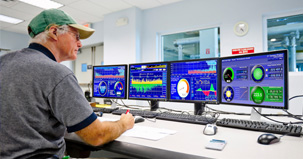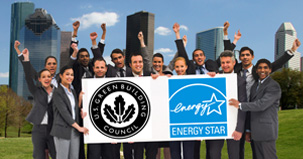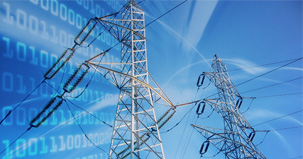- Home
- Smart Data
Smart Data
Actionable intelligence on energy and water use:
- Helps users identify inefficencies, and waste
- Provides real-time feedback on conservation
Right data for the right audience:
- Facility managers identify when and where energy is wasted
- CFO's can track and verify financial savings from initiatives
- Company knows its carbon and water footprint
Related Products
 Information any time, anywhere
Information any time, anywhere - Smart User
Smart User
Smart users leverage real-time data and reduce energy and water use by:
- Continuously identifying opportunities
- Acting on opportunities
- Tracking and verifying savings
- Sustaining savings
Related Products
 Monitor, Manage, Maintain
Monitor, Manage, Maintain - Smart Community
Smart Community
A smart community is one where all stakeholders are engaged in energy and water conservation. A smart community can be achieved by:
- Showing people precisely how much they are using
- Providing real-time feedback on conservation actions
- Effectively communicating efficiency results
Related Products
 Communicate and Conserve
Communicate and Conserve - Smart Grid
Smart Grid
Smart grid, as we define it, is a "green grid", with efficient resource use and the key to a low-carbon future. We help our customers prepare for the smart grid by:
- Engaging users with smart data
- Enabling smart users to increase resource efficiency
- Educating & empowering smart communities
Related Products
 Smart grid and a smarter future
Smart grid and a smarter future - Smart Buildings
Smart Buildings
Smart buildings maximize resource (energy, water, capital) efficiency. These buildings are optimized using energy and water management process with high data visibility which lead to reduced energy and water spending.
- Higher operating income and higher asset values for owners
- Increased productivity for occupants
- Lower carbon footprint for the community
 Resource efficient buildings
Resource efficient buildings
Subtitle!
Recent Posts
Education and Energy Conservation
It goes without saying that “knowledge is power.”
Knowledge comes at us fast and furiously all day long and, for the most part, especially in the energy sector, information is being updated almost quicker than we can digest the first piece of data we receive from the media.
Of course, there will always be those who are in the know. Environmentalists and homesteaders who prefer to be off the grid will always seek out new energy conserving technologies. However, staying ahead of the learning curve can seem impossible for the “Average Joe.” It’s understandable since even those who really would like to stay informed can easily get inundated with information they don’t understand.
The good news is that new technologies are springing up all the time and they are becoming easier to learn about and adopt.
Education about energy conservation is also important in a practical sense; no one can know how much energy they’re wasting unless they monitor their own usage. The Nature Conservancy predicts that by the year 2030, facilities used for energy production in the United States will occupy a land area larger than Minnesota. A huge factor in this alarming projection is the hunt for clean domestic energy—energy used in the household. It makes no sense that the people using up the most energy are least in the know about how to conserve it.
Without education, there is no motivation.
Though the volume of consumers choosing alternative energy sources is constantly growing, the number is still low considering that the voluntary renewable energy market has allowed consumers to choose what type of electricity they want from the grid since 1997. For a program that has been around for over a decade, the word is still not out completely.
Energy efficient appliances, such as washers, dryers and refrigerators, are certainly a step in the right direction when it comes to cutting back on domestic energy waste. But do these appliances cause complacency? Perhaps. It’s easy for people to think they are doing their part when they “go green” with appliances.
The truth is that energy efficient appliances are only the first step to significant energy consumption cutbacks, it is crucial that the message get out to the public in a thorough yet easy to understand context.
Industry insiders have to make their best efforts to disseminate information efficiently and more clearly to the general population. If you are wondering what you can do to become more environmentally friendly, the answer is fairly simple – and it’s free. Start talking.
With online and social media outlets readily available to anyone who wants to use them, it seems that there is no excuse for keeping the message secret. Surf the ‘Net. Find out about ways you and your family and friends can get in on the energy savings race. Tell people and encourage participation.
Time is of the essence. The funny thing is that it would be difficult to find someone who is actually against conserving energy – and subsequently saving money. Do your part to make sure people can move from “desire” to “action.”
It’s time to really face facts. All the interest in “going green” in the world isn’t going to get us where we want to go. Why? We don’t know what we don’t know.
The role of education in the task of energy conservation cannot be understated. It’s incumbent upon each and every person to continue to learn and stay informed. While it may be true that individuals can only do so much to ebb the tide of worldwide energy waste, sharing knowledge and spreading information on energy conservation is key to massive adoption of behaviors that will save energy and money.
On the other hand, “Big Business” is in a much better position to put in place programs to encourage access to information. Call it self-serving marketing if you want. However, consumers are creatures of habit. Larger companies have a responsibility to continue to “talk green” and to help make information accessible about saving energy and the environment at-large.
No matter who you are – big or small – get in the game and do your part. The planet depends on it.
Originally posted in renewableenergyworld.com